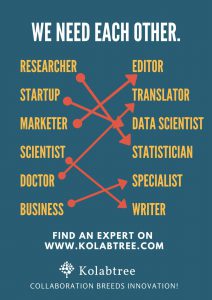Subscribe to our newsletter
How Academia Can Use the Power of Digital Technology for Cross-border Collaboration
Science can never be restricted by lines on a map. Collaborative research is the key to problem-solving and innovation, and this is exemplified by some of the collaborations we’ve witnessed so far. Take ATLAS’s CERN, of which 38 countries are a part, or take the Human Genome Project, which was carried out across six countries. NASA and ISRO’s SAR mission aims to study global environmental change, while Sanofi and Google are trying to develop innovative treatments for diabetes. Five tech giants – Google, Amazon, IBM, Facebook and Microsoft – have recently formed the Partnership on Artificial Intelligence to Benefit People and Society. Collaborative platforms can also help deliver quality medical services around the world – John Hopkins works with institutions in Canada, Turkey, UAE, Singapore and Brazil, just to name a few. Networks like Catapult UK connect businesses, engineers and scientists who can work together to transform ideas into innovative products and services, driving economic growth.
Academia-industry partnerships are usually a win-win situation. The institution receives funding and recognition; the company gets innovative products backed by scientific research. These partnerships allow companies to access to the expertise of highly qualified individuals. And we know that strong R&D teams form the foundation of every innovative organization. But small businesses often lose out here. SMEs, startups and small to mid-size labs do not have access to specialized talent. Hiring experts in-house, especially for short-term projects, can be impractical and unaffordable.
When it comes to collaboration within academia, we have proof that individual researchers also no longer want to work in isolation. As science becomes increasingly interdisciplinary, there are multiple overlaps in the skills and knowledge required for different fields of studies. According to a UNESCO report,
“One in four scientific articles produced around the world were cosigned by a foreign collaborator in 2014, compared to one in five a decade earlier.”
Countries all over the world are joining hands to help fuel research and innovation, in a political climate that is becoming alarmingly anti-science. Under Horizon 2020, the EU’s research and innovation programme, academia in the EU and the USA will be able to work together closely. An article published in Nature last year says that:
“The leading edge of scientific discovery is now in the realm of international collaboration networks rather than individuals, institutions or nations.”

So where are the platforms that allow individual researchers to collaborate? Nature breaks down the usage of digital tools such as social media networks, Research Gate, Academia.edu and Mendeley. But do these platforms help in forming collaborative partnerships?
Nature found that a majority of scientists simply wanted to maintain a digital presence in case anyone wanted to reach out to them.Typically, researchers and postdocs still network at traditional academic conferences. But attending a scientific conference can be an expensive and time-consuming affair. While reliable statistics are hard to come by, a report published by IEEE in 2007 finds that their average conference registration fee was $451. However, the registration fee only accounts for 24% of total costs, while airfare and hotel costs take up 26% and 24% respectively. And attending a conference is only the first step – you have to be in the right place at the right time and get the right person to notice your work. And most importantly, you need the right social skills.Researchers, who already spend a bulk of their time trying to achieve results and get them published, often dread having to network in person.
Kolabtree is an online platform that is helping to bridge this gap, by making scientific talent more affordable and accessible. We connect businesses and labs to PhD-qualified experts for short-term projects, helping them overcome geographical barriers, limited funding and restrictive policies. We believe that there is a real need, now more than ever, for scientists and industries to collaborate with each other and among themselves. Kolabtree’s 2700+ global pool of experts include scientists, data analysts, statisticians, writers and editors from institutions such as NASA, MIT, Harvard, Yale, Cambridge, Oxford, and more. Our platform allows you to upload a project, receive bids from experts and work with the the expert of your choice. You choose the budget and release a payment only if you’re satisfied with the outcome. Our interface allows you to also interact with each expert who’s bid for your project before selecting one who’s best suited for your requirements.
We’ve been surprised and thrilled at the kind of projects we’ve received. Through Kolabtree, a social science researcher in the USA successfully worked with an astrophysicist in the UK to analyze huge data sets. An Amazon reseller in the US hired a data analyst from the Netherlands who helped him predict his sales over a period of time. A Brazilian open access journal was able to hire a team of global peer reviewers at short notice. Kolabtree’s become the one-stop shop for postdoc expertise across various subject areas, from biotechnology to mathematics.

We live in a time when we’re experiencing uncertainty, fear and hostility on a global level. With countries shutting down their borders, and the risk of reduced funding and freedom for science, we feel the need to encourage cross-border collaborations even more. We’ve also launched the initiative, #researchwithoutborders, that aims to showcase collaborative science and tech projects from around the world. We hope to help individuals and businesses the world over access the talent they’re seeking through our platform. It’s one step towards better collaboration and better innovation.
Ramya Sriram is a freelance writer and cartoonist. She currently manages digital content at Kolabtree (www.kolabtree.com), a London-based startup that connects labs and businesses to scientists from all over the world. Kolabtree’s experts include 2700+ PhD-qualified specialists across a wide range of subject areas from institutions like NASA, Harvard, Oxford, Cambridge, and more. Their mission is to accelerate academia-business and academia-academia collaboration across multiple communities.

